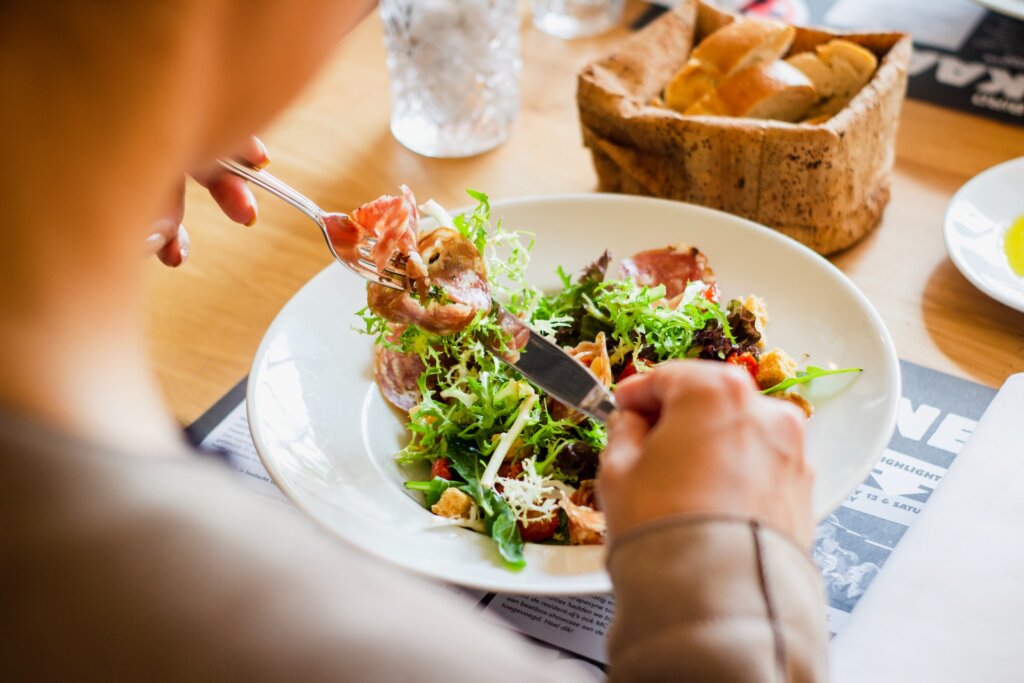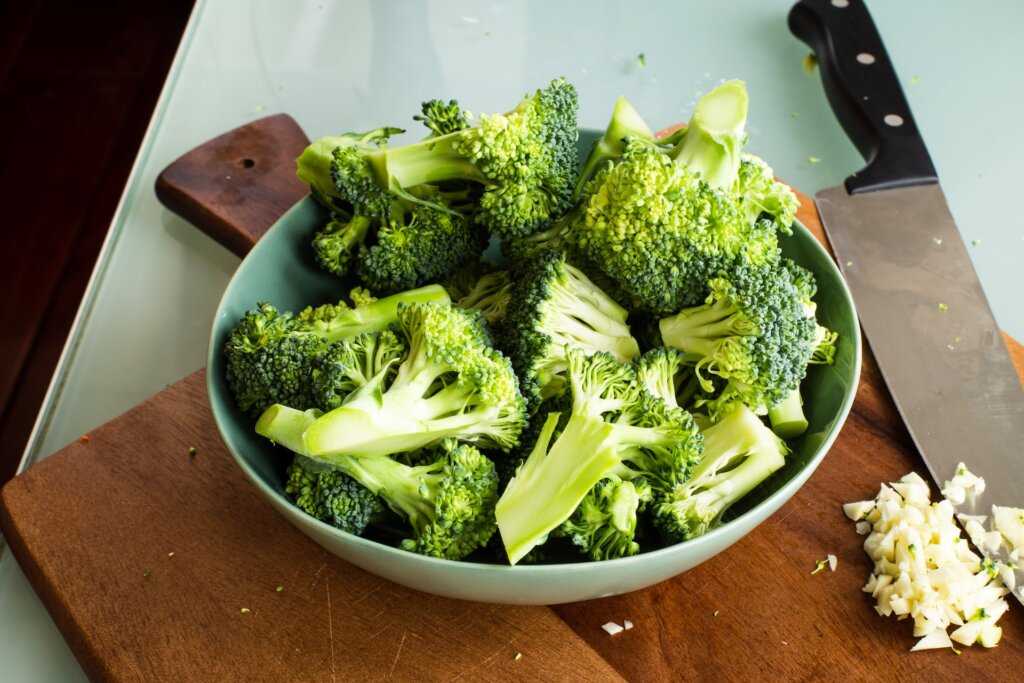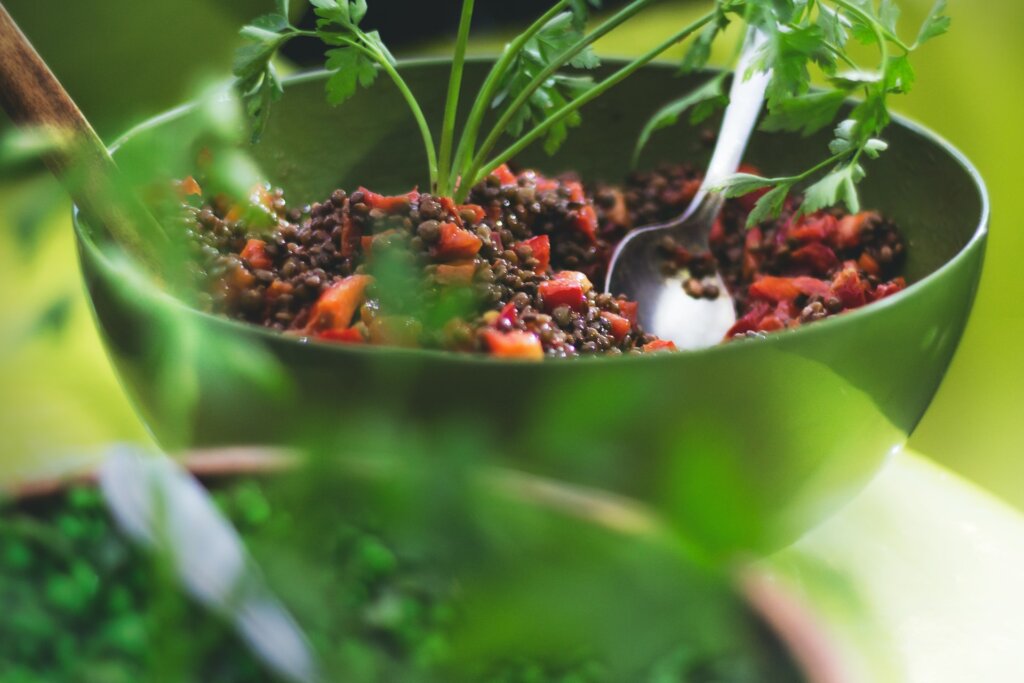Whether it's for health reasons or to achieve an ideal physical shape, losing weight can sometimes be difficult, especially when we are asked to follow a diet which however causes tiredness, hunger attacks, and general dissatisfaction. Which usually happens when it comes to diets based on calorie control.
But are all diets like this? Definitely no. For example, low-carb diets have several benefits:
- reduce appetite
- cause rapid weight loss
- improve your metabolic health at the same time
In this article, we will see some tricks to follow a weight loss diet that does not make you suffer from hunger pangs.
1. Cut down on refined carbohydrates
One way to lose weight quickly is to cut down on sugars and starches, or carbohydrates. This could be with a low-carb eating plan or by reducing refined carbohydrates and replacing them with whole grains.
When you do this, your hunger levels go down, and you generally end up eating fewer calories. With a low-carb meal plan, you'll be using stored fat burned for energy instead of carbohydrates, making it ideal as a weight-loss diet. If you choose to eat more complex carbohydrates such as whole grains along with a calorie deficit, you will benefit from higher fiber and digest it more slowly. This makes them more filling to keep you satisfied.

A 2020 study confirmed that a very low-carb diet is beneficial for weight loss even in older people. Research also suggests that a low-carb diet can reduce cravings, which can lead to eating fewer calories without thinking about it or feeling hungry. Note that the long-term effects of a low-carb diet are still being researched. It can also be difficult to adhere to a low-carb diet, which can lead to yo-yo dieting and less success at maintaining a healthy weight.
There are potential drawbacks to a low-carb diet that may lead to a different method. Low-calorie diets can also lead to weight loss and be easier to maintain for longer periods of time. If you opt for a diet that instead focuses on whole grains over refined carbohydrates, a 2019 study correlated high whole grains with lower body mass index (BMI).
IN SHORT:
Reducing sugars and starches, or carbohydrates, from your diet can help curb your appetite, lower your insulin levels and cause you to lose weight. But the long-term effects of a low-carb diet are not yet known. A low-calorie diet may be more sustainable.
2. Eat proteins, fats and vegetables
Each of your meals should include:
- a source of protein
- source of fat
- vegetables
- a small serving of complex carbohydrates, such as whole grains
Protein
Eating a recommended amount of protein is essential to help maintain health and muscle mass while losing weight. Evidence suggests that eating adequate protein can improve cardiometabolic risk factors, appetite and body weight. Many factors determine your specific needs, but in general, the average person needs:
- 56-91 grams of protein per day for the average man
- 46-75 grams per day for women
Weight loss diets formulated with adequate amounts of protein can:
- reduce cravings and obsessive thoughts about food by 60%
- cut the urge to snack late at night in half
- make us feel full
Healthy protein sources include:
- meat: beef, chicken, pork and lamb
- fish and seafood: salmon, trout and shrimp
- egg: whole eggs with yolk
- vegetable proteins: beans, legumes, quinoa, tempeh and tofu
Low-carb vegetables and leafy greens
Don't be afraid to load up your plate with leafy greens. They are packed with nutrients, and you can eat large quantities without increasing calories and carbohydrates much.

Vegetables to include for low-carb or low-calorie meal plans include:
- broccoli
- cauliflower
- spinach
- tomatoes
- kale
- Brussels sprouts
- cabbage
- coast chard
- lettuce
- cucumbers
Healthy fats
Don't be afraid to eat fat.
Your body still needs healthy fats no matter which eating plan you choose. Olive oil and avocado oil are great choices to include in your meal plan.
Other fats like butter and coconut oil should only be used in moderation due to their higher saturated fat content.
IN SHORT
Assemble each meal from a protein source, source of healthy fats, complex carbohydrates and vegetables.
Leafy greens are a great way to bulk up a low-calorie, high-nutrient meal.
3. Exercise
Exercise, while not necessary for weight loss, can help you lose weight faster. Weight lifting has particularly positive benefits.
By lifting weights, you'll burn a lot of calories and keep your metabolism from slowing down, which is a common side effect of weight loss.
Try going to the gym three to four times a week to lift weights. If you're new to the gym, ask a trainer for advice. Make sure your doctor is also aware of any new exercise plans.
If weight lifting is not an option for you, doing some cardio exercises like walking, jogging, running, cycling or swimming is very beneficial for weight loss and overall health.
Both cardio and weight lifting can help you lose weight.
IN SHORT
Resistance training, like weight lifting, is a great option for losing weight. If this is not possible, cardio workouts are also effective. Choose what is sustainable for you.
to know more
And what about calories and portion control?
If you opt for a low-carb meal plan, you don't need to count calories as long as you keep your carb intake very low and stick to low-carb proteins, fats, and vegetables. If you find yourself failing to lose weight, you may want to track your calories to see if that's a contributing factor.
If, on the other hand, you are resorting to a calorie-deficit weight loss diet, you can use a free online calculator. Enter your gender, weight, height and activity levels. The calculator will tell you how many calories to eat per day to maintain weight, lose weight or lose weight fast.
Note that eating too few calories can be dangerous and less effective for losing weight. Aim to reduce your calories by a sustainable and healthy amount based on your doctor's recommendations.
IN SHORT
Calorie counting isn't usually necessary for losing weight on a low-carb meal plan. But if you're not losing weight or on a calorie-restricted eating plan, calorie counting can help.
4. 9 weight loss tips
Here are 9 more tips to lose weight faster:
1. Eat a high protein breakfast. Eating a high-protein breakfast could help reduce cravings and calorie intake throughout the day.
2. Avoid sugary drinks and fruit juices. The empty calories of sugar are not good for your body and can hinder weight loss.
3. Drink water before meals. One study showed that drinking water before meals reduces calorie intake and can be effective in weight management.
4. Choose foods that promote weight loss. Some foods are better than others for weight loss. Here is a list of healthy weight – weight loss friendly foods.
5. Eat soluble fiber. Studies show that soluble fiber can promote weight loss. Fiber supplements like glucomannan can also help.
6. Drink coffee or tea. Consuming caffeine can boost your metabolism.
7. Base your diet on whole foods. They are healthier, more filling, and less likely to cause overeating than processed foods.
8. Eat slowly. Eating fast can lead to weight gain over time, while eating slowly makes you feel fuller and boosts weight-losing hormones.
9. Sleep well. Sleep is important for many reasons, and poor sleep is one of the biggest risk factors for weight gain.
IN SHORT
Eating whole foods, more protein, soluble fiber and less sugar can help you lose more weight. Don't forget to sleep well at night too.
Examples of meal ideas for quick weight loss
These sample meal plans are low-carb, which limits carbs to 20-50 carbs per day. Each meal should have proteins, healthy fats and vegetables.
If you prefer to lose weight while still eating complex carbohydrates, add in some healthy whole grains such as:
- quinoa
- whole oats
- whole wheat
- brand name
- rye
- barley

Breakfast ideas
- poached egg with sliced avocado and a side of berries
- Spinach, Mushroom, and Feta Crustless Quiche
- green smoothie with spinach, avocado and nut milk and a side of cottage cheese
- unsweetened greek yogurt with berries and almonds
Ideas for lunch
- smoked salmon with avocado and a side of asparagus
- lettuce wrap with grilled chicken, black beans, red pepper and salsa
- coleslaw and spinach with grilled tofu, chickpeas and guacamole
- BLT wrap with celery sticks and peanut butter
Dinner ideas
- enchilada salad with chicken, peppers, mango, avocado and spices
- Baked ground turkey with mushrooms, onions, peppers and cheese
- antipasto salad with white beans, asparagus, cucumber, olive oil and parmesan
- Roasted cauliflower with tempeh, Brussels sprouts and pine nuts
- baked salmon with ginger, sesame oil and roasted zucchini
Snack ideas
- cauliflower hummus and vegetables
- healthy homemade trail mix with nuts and dried fruits
- chipped cabbage
- cottage cheese with cinnamon and flax seeds
- spicy roasted chickpeas
- roasted pumpkin seeds
- bags of tuna
- steamed edamame
- strawberries and brie
How fast will you lose weight?
You can lose 5-10 pounds of weight — sometimes more — in the first week of following a weight loss diet, and then consistently lose weight over the next few weeks. The first week is usually a weight loss of both body fat and water.
If you're new to the world of dieting, weight loss can happen more quickly. The more weight you have to lose, the faster you will lose it. Unless your doctor suggests otherwise, losing 1 to 2 pounds a week is usually a safe amount. If you are looking to lose weight faster, talk to your doctor about establishing a safe level of calorie reduction.

Aside from weight loss, a low-carb diet can improve your health in a number of ways, though the long-term effects aren't yet known:
- blood sugar levels tend to drop significantly on low-carb diets
- triglycerides tend to go down
- LDL (bad) cholesterol goes down
- blood pressure improves significantly
Other types of diets that reduce calories and increase whole foods are also associated with better metabolic markers and slower aging. Ultimately, you may find a more balanced diet that includes complex carbohydrates is more sustainable.
IN SHORT
Significant weight can be lost on a low-carb or low-calorie diet, but the rate depends on the individual.
Overall weight loss can improve some health markers, such as blood sugar and cholesterol levels.
Concluding
Reducing carbohydrates or replacing refined carbohydrates with complex carbohydrates will likely reduce appetite and hunger. This eliminates the main reasons why it is often difficult to follow a weight loss diet correctly. With a sustainable low-carb or low-calorie meal plan, you can eat healthy food until you're full and still lose a significant amount of fat.
The initial drop in water weight can lead to a drop in scale within days. However, fat loss takes longer.




